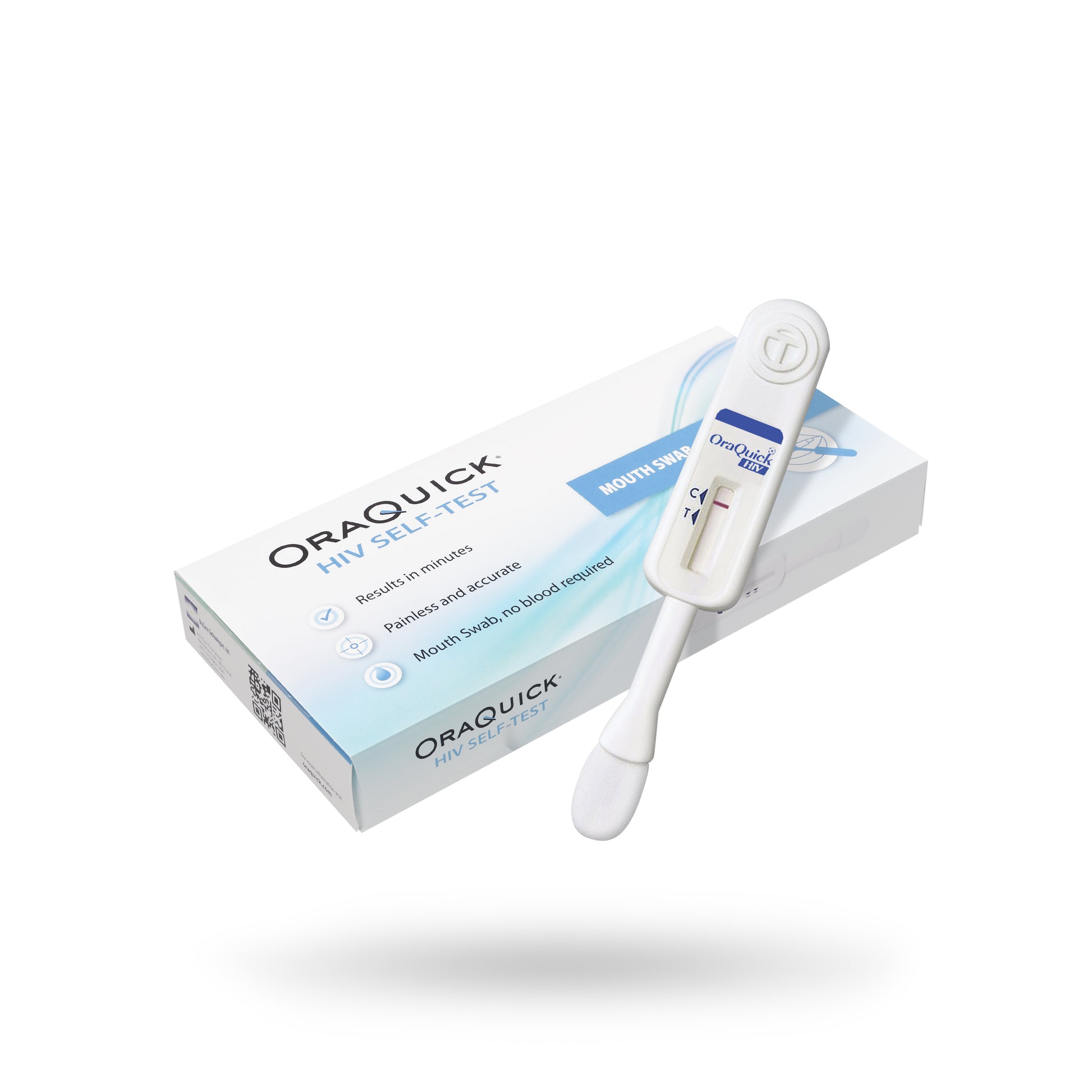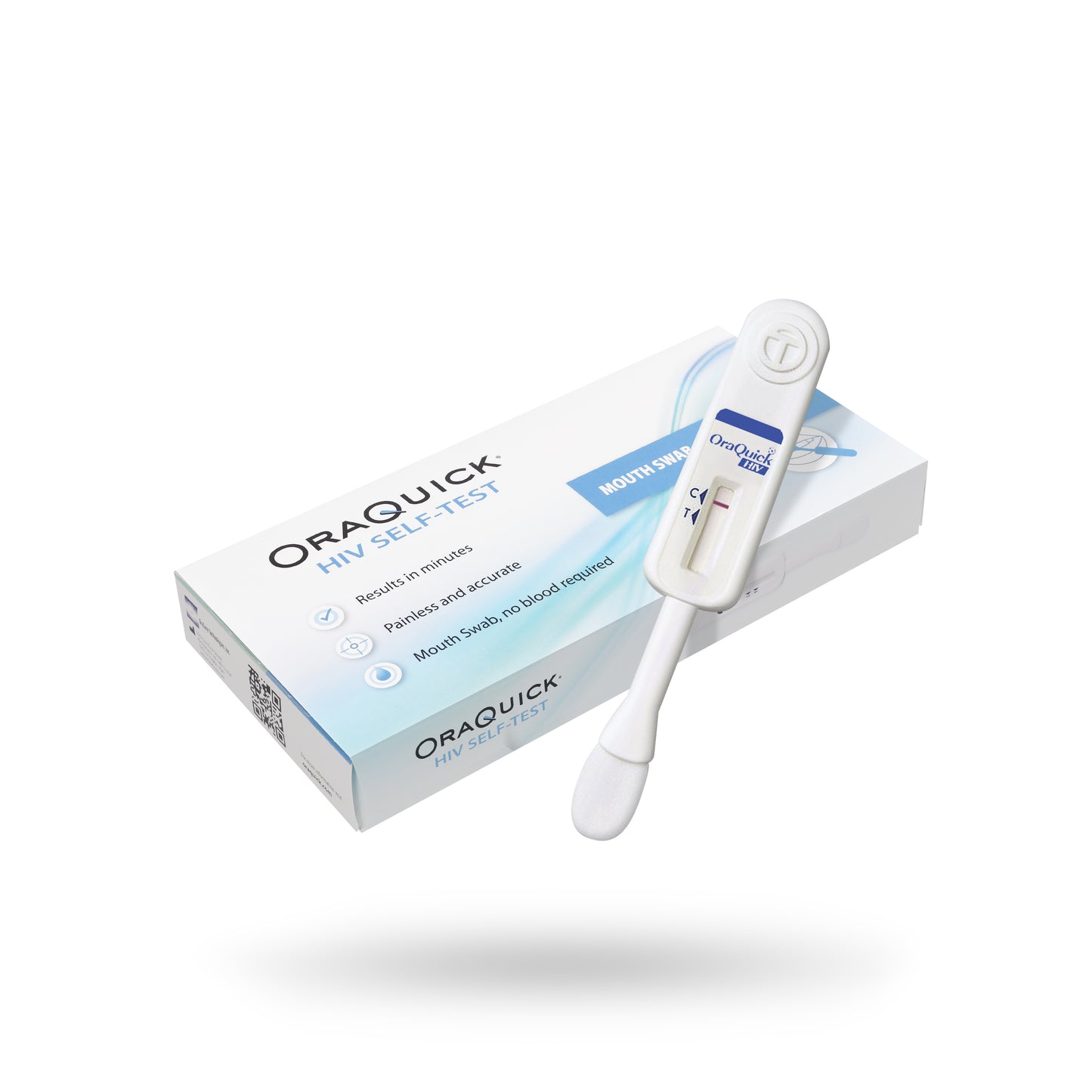HIV FAQ's
Find out more about testing for HIV, HIV and AIDS, and how to protect yourself from HIV in our FAQs.
About HIV self testing
Why has the law changed? HIV is now a treatable condition and there is a global plan to end the HIV/AIDS epidemic by 2030 with the 2025 AIDS TARGETS. The first step is making sure people know their status and this means giving everyone more choice in how to test. The BioSure team have helped generate data to prove people do want to test themselves for HIV, they can self-refer into treatment and there are no detrimental social harms. We have a very real role to play in creating the world's first AIDS free generation.
What’s the difference between ‘self-sampling’ and ‘self-testing’ for HIV? Home HIV self-sampling kits are a postal service where you use the kit to take your own sample of blood and then post it off to a laboratory for analysis. You get your result days later via either phone or text (depending on your result). HIV Self Testing kits require just an oral fluid sample and give you your result while you wait, without anyone else being involved.
How do I know if my HIV Self Test is reliable? The OraQuick HIV Self Test has a CE Mark. This means it is strictly regulated and highly scrutinised to make sure it meets stringent standards. It is registered with the Medicines and Healthcare Agency (MHRA) and the European Medicines Agency (EMA). If you are buying another test it is really important it has a CE mark specifically for 'HIV Self Testing' and not for 'Professional Use Only' for it to be approved. The CE mark should have 4 numbers underneath it, so please check carefully.
About HIV & AIDS
What does HIV stand for? HIV stands for Human Immunodeficiency Virus. It is a virus that attacks the immune system, making it weaker. Eventually the immune system can become so weak that it is not strong enough to fight infections and diseases.
What does AIDS stand for? AIDS stands for Acquired Immune Deficiency Syndrome and is a group of symptoms that can eventually result from HIV if it is left untreated.
Are HIV and AIDS the same thing? No. If someone has HIV, this means they have the HIV virus in their body. When their immune system becomes so weak it can’t fight off a range of illnesses, they are then considered to have developed AIDS. People who are HIV positive do not automatically go on to develop AIDS, in fact it is very unlikely to develop if treatment is taken regularly and is started early enough. Because the way we think about HIV is changing, the term late-stage HIV is increasingly being used instead of AIDS.
How do you get HIV? The most common way of getting HIV in the UK is by having anal or vaginal sex without a condom. The Health Protection Agency report that 95% of those diagnosed with HIV in the UK acquired it as a result of sexual contact.
How is HIV transmitted? HIV is transmitted when infected body fluids get into another person’s bloodstream. These body fluids include:
- Blood (including menstrual blood).
- Semen.
- ‘Pre-cum’ (the clear liquid that comes from a man’s penis when he is sexually excited).
- Vaginal fluid.
- Anal mucus (the lining inside of the anus and rectum).
- Breast milk.
Body fluids such as tears, sweat, saliva and urine do not contain enough virus to cause infection. HIV cannot be transmitted by kissing or spitting.
The HIV virus cannot be transmitted through the air.
Virtually all HIV infections are transmitted through unprotected penetrative sex. Sexually transmitted infections in either partner can greatly increase the degree of risk. The most common ways the virus can get into your bloodstream are:
- Through the thin lining inside your anus
- Through the cells lining the vagina.
- Via cuts or sores in your skin.
- By injecting (with a contaminated needle).
Other ways of getting HIV include:
- through damaged penile tissue and the mucous membranes in the urethra and on the head of the penis – particularly underneath the foreskin
- Transmission from mother to baby during pregnancy, birth or breastfeeding
- Through oral sex or sharing sex toys (although this risk is significantly lower than for anal and vaginal sex).
Is there a cure for HIV? HIV is a manageable disease, although there is not a cure. Advances in treatments mean that the majority of those living with the virus remain fit and well and carry on living full and healthy lives on treatment. The earlier diagnosis is made and treatment started, the better the outcome. Late diagnosis is the most important factor with HIV for life expectancy and how effective treatments are.
What does "Undetectable" mean? - Antiretroviral treatments (ART's) are now so good, that if they are taken correctly the virus can be supressed to undetectable levels. The virus is still there but there literally isn't enough to find in the person's blood. The incredible result of this is that not only is the person's health protected, but it is scientifically proven that they cannot pass the virus on. 1,099 organizations from 105 countries have signed up to share the U=U campaign (Undetectable equals Untransmittable) message in ways that engage their communities. BioSure is a U=U Partner.
How can I protect myself from HIV?
You can reduce your risk of exposure to HIV by not having unprotected sex with someone who is unsure of their HIV status. In fact you are far safer to have unprotected sex with someone who has a maintained undetectable viral load than you are to have protected sex with someone who doesn't know their status.
Do condoms work? Condoms are proven to prevent HIV transmission. Be confident in your choices and relationships, have a look at the Stay Negative tab.
Condoms have a very low failure rate (they only usually fail if they don't fit properly, so it is worth trying a few different widths and lengths to find the right size) and can be used for all types of sex; vaginal, anal and oral. When used correctly every time you have sex, condoms are the best way to prevent HIV and also other sexually transmitted infections (STIs).
It's important to always check the expiry date of your condom (they go out of date!) and only use condoms that have a CE mark.
The basics to make sure you’re using a condom properly:
- use a new condom each time you have sex
- put the condom on as soon as an erection occurs and before any sexual contact (whether vaginal, anal or oral)
- don't use oil-based lubricants, (no Vaseline or baby oil!) because they can weaken the material and increase the chances of splitting. Use water-based lubricants instead
- the man should hold the condom firmly to keep it from slipping off and withdraw from his partner immediately after ejaculating,
There are also female condoms which are made of thin plastic and have a flexible rings at either end which are inserted into the vagina before sex. These also prevent pregnancy and protect against HIV and other STIs.
What about PrEP? PrEP is a drug that can be taken by HIV negative men or women before sex and reduces the risk of getting HIV, a similar concept to the contraceptive pill stopping pregnancy in women. PrEP is now available on the NHS in England and can be bought from some online pharmacies. There is a lot more information here.
So what about testing?
Why should I test for HIV? If you may have been at risk of exposure to HIV then it is always better to know and find out your HIV status. Knowledge is power. If you have HIV then the earlier you are diagnosed the better because anti-retrovirals are now so effective that with correct, regular treatment someone living with HIV can expect to live a long healthy life and have a normal life expectancy. But if you don't know, you can't treat.
Why should I self test for HIV? Self testing offers you a greater level of convenience and discretion than other methods of testing as you can test when and where you want to. It is the only way to be the first person to know your status. It puts you in control.
Why shouldn’t I self test for HIV? It is your choice where and how you will be most comfortable having a test. If you feel anxious about self-testing and getting your own result, you could speak with a friend or professional before buying one, or consider having somebody with you while you perform the test. HIV testing is available in a range of professional healthcare settings, including free testing in NHS Sexual Health (GUM) Clinics where counselling is also available.
What are the advantages of using an oral fluid test? The OraQuick HIV Self Tests are designed to provide you with fast and accurate results while testing conveniently at home, or at a place and time or your choosing. The OraQuick HIV Self Test has proven accuracy of >99.7%. It just needs an easy and pain free swab of the gums to determine your status.
How often should I test for HIV? This really depends on the lifestyle choices you make. If you know you make choices that put you at risk, including having unprotected sex with a person or people who do not know their HIV status, it is recommended that you test regularly. National guidelines recommend repeat testing every 3 months. You can make life easy and we'll remember for you, click here for subscription orders and get discounted prices.

Paywhirl
UK - Receive Test Every 3 Months
Share

